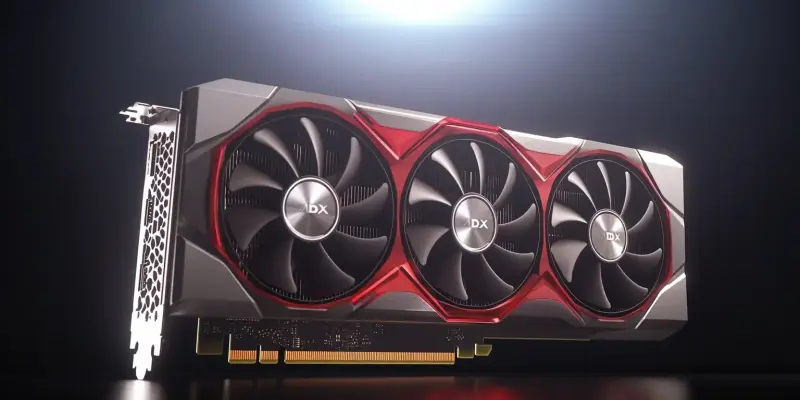In a recent benchmark test using Call of Duty Black Ops 6, AMD’s midrange Radeon RX 9070 series GPUs delivered surprising performance, raising questions about whether AMD may have underestimated their capabilities. The GPUs achieved an impressive average of 99 FPS at native 4K resolution on the Extreme preset, without relying on the upscaling technology FSR 3.1 or the yet-to-be-released FSR 4. This level of performance is unexpected for a GPU series that AMD has marketed as a midrange offering, suggesting that the RX 9070 might possess more raw power than initially indicated. The tests were conducted with AMD’s new Ryzen 9950X3D processor and early alpha drivers, hinting at potential further improvements in performance as drivers mature.
Surprising Benchmark Results
Comparisons with Nvidia’s higher-end RTX 4080 Super further highlight the RX 9070’s impressive capabilities. The RTX 4080 Super managed around 129 FPS under similar conditions but with DLSS Quality resolution upscaling enabled, a technology known for enhancing performance. In contrast, the RX 9070’s results were achieved without such enhancements, showcasing its raw power. This unexpected showing from the RX 9070 series suggests that AMD may have been conservative in their marketing approach, potentially downplaying the GPU’s capabilities to set lower consumer expectations. This might be a strategic move, especially with Nvidia’s impending release of the RTX 5000 series, which many expect to surpass AMD’s RX 9060 and 9070 models in performance.
There could be several reasons behind AMD’s decision to understate the RX 9070’s potential. One possible explanation is that AMD aimed to create an element of surprise and gain favorable market perception by exceeding performance expectations. Another possibility is that they wanted to position the RX 9070 competitively against Nvidia’s offerings, particularly with the anticipated advances in DLSS 4 and Multi Frame Generation technology. By managing consumer expectations, AMD could soften the perceived performance gap when Nvidia’s new GPUs are officially unveiled at CES 2025.
The Exclusive Advantage of FSR 4
Another notable point of discussion is the exclusivity of FSR 4, which is currently limited to the RX 9070 series. Initially, this decision might seem disappointing to potential customers, as they could perceive it as a deliberate limitation to differentiate product lines. However, if FSR 4 performs comparably to Nvidia’s DLSS 4 while maintaining sensible pricing, this exclusivity might give AMD a critical competitive edge. The RDNA 4 architecture, which underpins the RX 9070 series, demonstrates formidable performance in early benchmarks. Should these GPUs continue to perform strongly, AMD could challenge the status quo in the midrange market segment, which historically has been fiercely competitive.
Furthermore, the strategic use of FSR 4 exclusivity might drive consumers towards the RX 9070 series, bolstering its market position. AMD could leverage this exclusivity as a selling point, potentially attracting users who prioritize performance and affordability. The success of such a strategy would depend on FSR 4 delivering substantial improvements and proving to be as efficient as, or better than, DLSS 4. Consequently, AMD’s approach might redefine the midrange GPU category, elevating the RX 9070 series from a perceived midrange option to a competitive alternative to higher-end models.
Future Implications for AMD and the GPU Market
In a recent benchmark test with Call of Duty Black Ops 6, AMD’s midrange Radeon RX 9070 series GPUs delivered unexpectedly high performance, casting doubt on whether AMD has fully realized their potential. These GPUs hit an average of 99 FPS at a native 4K resolution using the Extreme setting, and they did so without depending on the upscaling technology FSR 3.1 or the upcoming FSR 4. Achieving such performance is unusual for a GPU series marketed as midrange, suggesting the RX 9070 holds more raw power than initially suggested by AMD. The tests also employed AMD’s new Ryzen 9950X3D processor paired with early alpha drivers, indicating that further performance enhancements may be possible as the drivers become more refined. This impressive outcome hints at significant untapped capabilities within the RX 9070 series, potentially changing how consumers view AMD’s midrange offerings. Additionally, this surprising result sparks curiosity about future updates and optimizations that could unlock even greater performance.

